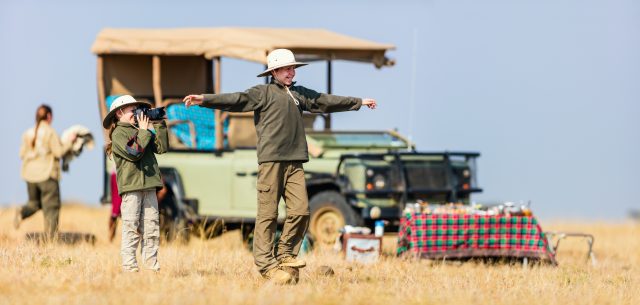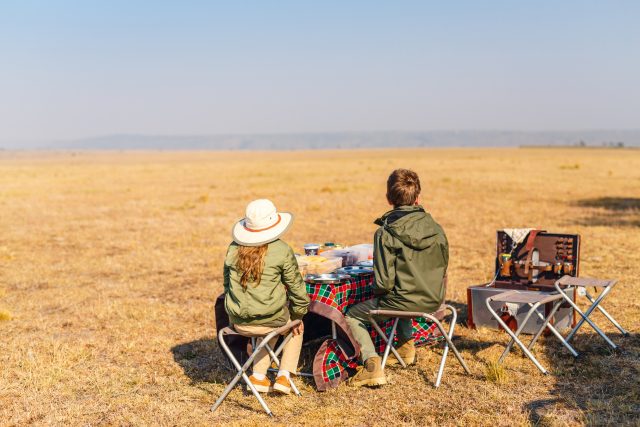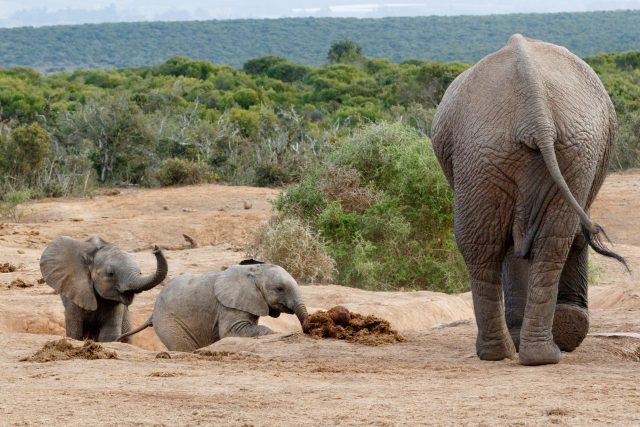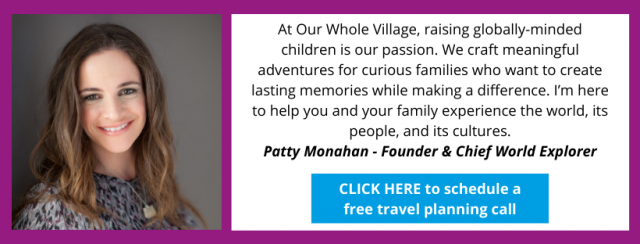Tips for Planning an Epic African Safari for Families
ABOUT
At Our Whole Village, we plan meaningful vacations for families who want to create lifelong memories and show their kids the world in a more conscious and intentional manner.
WORK WITH US
We help families take meaningful vacations so that they can escape everyday life, show their kids the world and make lifelong memories - with care, confidence and peace of mind.
THE BEST FAMILY VACATIONS BY AGE
Your (free) guide to the top travel destinations for families with babies, teens and everyone in between.
DOWNLOAD NOW
ABOUT US
December 11, 2020
One of my most treasured childhood memories is visiting South Africa with my family and our friends. The whole trip was magical, but there’s no denying that the safari portion was the highlight. I still remember the first lion pride we saw, the majestic elephants we stumbled upon, the elegance of the giraffes. I remember being amazed by the rangers and their knowledge and dedication. Most of all, I remember the laughs and the excitement we all felt during those three days in the bush. We were in heaven.
An African safari for families is certainly one of those unforgettable bucket list destinations and a beautiful opportunity to show kids abundant wildlife and wilderness and instill valuable lessons about conservation and sustainability. A family African Safari truly is a life-changing experience that will create memories that’ll last a lifetime.
However, because it ranks among the more expensive trips your family will ever take, it requires careful planning and a reliance on local knowledge.
Here are my tips when planning the ultimate family African safari.
1. Decide Where You Want to Go
Where to go on safari in Africa? That truly depends on a few factors:
- What you most want to see in terms of animals and geography
- Your children’s ages
- Your maximum feasible budget
- How many days you’d like to be out on the road
Some safari companies have minimum age requirements, so you’ll want to check those carefully. Working with an experienced family travel company will ensure you find the best activities for your family, even if your kids fall below the suggested school-age limit.
As you start exploring the wide world of African safari tours, you’ll also realize that some spots are much safer and more welcoming to families than others. Family-friendly safari destinations include national parks found in South Africa, Kenya, Tanzania and Botswana.

© Alexander Shalamov | Dreamstime.com
2. Give Yourself Plenty of Lead Time
How long does it take to plan an African safari? The answer to this question depends on the travel company you book with. Some may offer packages with less than six months lead time. But it’s important to remember that many families book their African safari experiences between one and two years in advance. So, start early so you can get exactly what you’re looking for and budget accordingly.
As for planning the trip yourself? Without local help, it would be very tough. Getting from one lodge to the next can be a problem as well as individual bookings. (Many African-based travel-related companies don’t work with individuals.) For these reasons, we recommend working with an experienced travel advisor. Their insider knowledge will help you with everything from where to best see animals to current ground conditions. For example, in Tanzania, the roads are poorly marked and often in less-than-great shape. You don’t want to find this out the hard way.
Besides, when you work with a knowledgeable advisor or small tour company specializing in family adventures, you don’t have to sweat these issues and can focus on what matters most: making memories with your family.
3. Give Glamping a Try
I know you might have reservations about camping, but permanently tented camps have become a vital aspect of the African safari experience in recent years, and with good reason. Not only do they offer luxurious accommodations, but these camps prove much smaller, creating a cozy and intimate atmosphere. What’s more, there’s something inescapably exciting about falling asleep and waking up to the sounds of nature.
If you’re a bit nervous about camping, remember that permanent tented camps are a far cry from the two-person nylon structure you may have attempted to erect during your child’s last Girl Scout expedition. Although African safari tents have canvas roofs and walls, you’ll enjoy full-size beds, electricity, and indoor plumbing.
Camps stock excellent, fresh food, which they whip into delectable dishes in the cooking tent (often under the watchful eyes of hyenas). And nights come with star-jammed skies and roaring campfires.

© Alexander Shalamov | Dreamstime.com
4. Budget, Budget, Budget
Let’s get one thing straight. African safaris are expensive. Get ready for a little sticker shock. For example, if you plan on bringing a family of four, this could represent the single largest investment you’ve made since purchasing your house and car!
Safari prices range from $5,000 (per person) to $50,000 depending on your destination, length of stay, transportation, and accommodation types. Yes, $50,000 sounds like a lot of money. But if your safari involves staying in posh lodgings at $4,000 per night and taking small aircraft to reach otherwise inaccessible areas, things will add up quickly.
An option to cut costs and still have an extraordinary experience is to opt for an off-season safari.
Springtime in Africa (November through March) is considered the shoulder or low season. Camps often go for half the price they do during the summer. What’s more, spring comes with some compelling advantages. Parks are less crowded and much greener, and you’ll get the chance to see plenty of baby animals.
You can also economize by choosing a destination that doesn’t require charter flights or as much driving. For example, Kruger National Park in South Africa might prove a more attainable destination (from your pocketbook’s perspective) than Tanzania.
Why? Unlike Tanzania’s parks, which lay spread out and require lots of driving and extra travel days (think at least six), you can get around Kruger’s breathtaking national park in as little as three or four days while still affording the full breadth and depth of what the park has to offer.
Other economizing options include a budget camping safari with a cook and driver-guide who put up tents and transport mattresses. These setups usually make camp at sites with bathrooms and showers.

© Mark De Scande | Dreamstime.com
5. Include Culturally-Rich Experiences
Visiting Africa is a fantastic opportunity to show children that the continent is about a lot more than the great animals, glorious as they are. Combine your safari with local cultural immersion experiences that give you an insight into the local way of life, customs and traditions.
Of course, not all cultural experiences are created equal. It is important to do your due diligence and find those that promote a genuine cultural exchange and directly benefit the local population, supporting the cultural heritage and the well being of local communities.
I personally love finding those authentic community-owned businesses and experiences for my clients, to ensure that the families get an accurate taste of the African continent and its incredible diversity.
6. Support Conservation Efforts
Wildlife safaris play an important role in Africa’s economic development, conservation, and sustainability. Many lodges and camps support local projects and conservation efforts, and offer opportunities for guests to get involved in a meaningful way.
Through junior ranger programs younger kids can take part in wildlife protection and tracking activities, as well as other day to day tasks.
Outside Nairobi, at Sheldrick Wildlife trust, families can visit and adopt a baby elephant and support their efforts to rescue and rehabilitate orphaned elephants, rhinos and other animals.
These experiences are the ones that will enhance your family vacation and create those amazing little moments that you and your kids will treasure forever.
An African Safari for Families
The tips above barely scratch the surface when it comes to planning your Africa family adventure.
Do you want to learn more and get additional inspiration?
Join us for some wine and a virtual safari in Southern Africa with our friends at Big Five on December 17th at 6pm EST. Find out more and register here.
OUR SERVICES
HOME
COPYRIGHT © OUR WHOLE VILLAGE 2021
DESIGN BY GIRLBOSS DESIGNER | CUSTOMIZED BY ALEX COLLIER DESIGN
about
TRAVEL SERVICES
DESTINATIONS
BLOG
PLAN A TRIP
FREE TRAVEL GUIDE
TERMS AND CONDITIONS
hello@ourwholevillage.com
+1 305 432 2612
